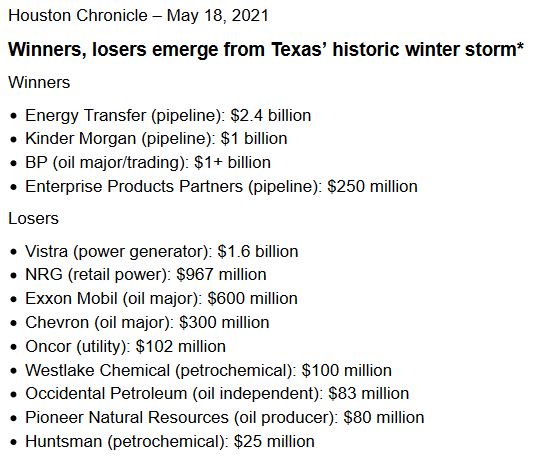This bill, signed by the Governor, fixes a problem with the provisions of the Texas Business and Commerce Code that grant a security interest in oil and gas production and proceeds to secure the payor’s obligation to pay royalty owners. I have written about this problem before. Previous bankruptcy court decisions held that this provision did not protect royalty owners when the payor was a company not organized in Texas.
Texas Solar Energy Boom
According to the Houston Chronicle, “ERCOT estimates the amount of solar capacity alone could more than double by May 2022, growing to more than 17,000 megawatts from about 7,000 megawatts in April. One megawatt is enough to power about 200 Texas homes on hot summer day.” That’s 3.4 million homes. Read the article here.
Winners and Losers from Historic Winter Storm
Travis County Court Holds Railroad Commission Has No Authority to Issue Permits for Allocation and Production Sharing Wells
Today a district court in Travis County held that the Texas Railroad Commission violated the Administrative Procedure Act by informally adopting rules for issuance of allocation and production sharing well permits without following the rule-making procedures of the Act. The Court ruled in an appeal by a mineral owner of the Commission’s order granting a well permit to Magnolia Oil & Gas Operating for a well in Karnes County.
The case is Opiela v. Railroad Commission of Texas, No. D-1-GN-20-000099, in the 53rd District Court of Travis County. Judge Karin Crump’s order can be viewed here. Opiela v. RRC Final Judgment (003) Our firm represents the Opielas in the case.
Magnolia’s well, the Audioslave 1H, was originally permitted by Enervest as an allocation well. The Opielas protested the permit, and while the protest was pending the Commission issued the permit and Enervest drilled the well. Magnolia then took over operation of the well and filed an application for an amended permit for the well as a production-sharing well. That permit was also granted over the Opielas’ protest, and Magnolia fracked and completed the well.
Collateral Attacks on Tax Foreclosure Sales vs. Due Process — Two Cases from El Paso Court of Appeals
Two unusual cases have recently been decided by the El Paso Court of Appeals, both arising out of the same underlying facts. Both deal with a tax foreclosure on royalty interests.
In the late 1990s an attorney and two mineral buyers got together and proposed to taxing districts to handle tax foreclosure suits for delinquent taxes on royalty interests. The tax foreclosures named a large set of defendants who were served by posting notice of the suit at the courthouse. Texas law allows notice of suit by posting or publication where the plaintiff has tried diligently to locate the defendant and has been unable to do so. The two mineral buyers, Joe Hughes and Duke Edwards, searched the tax records for owners with delinquent taxes, and the lawyer proposed to represent the taxing districts in foreclosing the tax liens. The lawyer’s fee was paid out of the proceeds from the sheriff sale of the royalty interests foreclosed on. Hughes and Edwards were hired to try to locate the delinquent royalty owners so they could be served with the tax suit. For those they could not locate, they provided testimony in the foreclosure suit that they diligently looked for the missing owners and were unable to find them, so the court would authorize service by posting. Hughes and Edwards received an “abstractor’s fee” for each “unlocatable” owner for whom they searched. At the sheriff sale, Duke and Edwards bid on and purchased some of the royalty interests sold.
In Mitchell v. Map Resources, No. 08-17-00155-CV, the El Paso Court of Appeals addressed an appeal of a suit by the Mitchells seeking to set aside a 1999 judgment for taxes and the sale of their interest in royalties. The case resulted in three opinions: the majority opinion by Justice Gina Palafox, a concurring opinion by Justice Alley, and a dissenting opinion by Justice Rodriguez. The court refused to set aside the sale.
Texas Legislature’s Overhaul of ERCOT Board Would Replace Experts With Political Appointees
Link here to Texas Tribune article. Not a good idea. ERCOT definitely made some mistakes in the freeze, but it had no authority to require generators to winterize. Everyone is still pointing the finger at everyone else. Another Texas Tribune article: the legislature is now considering creating a $2 billion taxpayer-funded account for those improvements.
Key Laws Texas Landowners Need to Know
Here is link to an excellent publication by Tiffany Dowell Lashmet, Assistant Professor and Extension Specialist at Texas A&M AgriLife Extension. Print it out and save it.
Sundown Energy v. HJSA No. 3 Limited Partnership: Another Poorly Drafted Retained Acreage Clause
Last week the Texas Supreme Court issued a per curiam opinion, without oral argument, reversing the judgment of the El Paso Court of Appeals in Sundown Energy LP v. HJSA No. 3 Limited Partnership, No. 19-10654. The lease at issue covers 30,450 acres in Ward County. The case is another illustration of how parties fail to clearly express their intent in drafting retained acreage clauses.
The lease provides that, after the end of its six-year primary term, the lessee must release acreage not held by production unless the lessee was engaged in a “continuous drilling program:”
The obligation . . . to reassign tracts not held by production shall be delayed for so long as Lessee is engaged in a continuous drilling program on that part of the Leased Premises outside of the Producing Areas. The first such continuous development well shall be spudded-in on or before the sixth anniversary of the Effective Date, with no more than 120 days to elapse between completion or abandonment of operations on one well and commencement of drilling operations on the next ensuing well.
Warren Buffett group lobbying Texas lawmakers for deal to build $8 billion worth of power plants for emergency use (from Texas Tribune)
The following article appeared today in The Texas Tribune:
Cassandra Pollock
The Texas Tribune Thu, 25 Mar 2021 13:01:53 -0500
BlueStone v. Randle — A Win for Royalty Owners on Post-Production Costs
 On March 12 the Texas Supreme Court issued its opinion in BlueStone Natural Resources II, LLC v. Walker Murray Randle, No. 19-0459, affirming most of the judgment of the court below in favor of the royalty owners. The Court’s opinion contains a summary and discussion of its prior cases on post-production costs and attempts to reconcile those prior opinions and clarify its views on the issue. I believe the opinion does provide clarification and substantially reduces the precedential value of its first case addressing post-production costs, Heritage v. Nationsbank. The Court also discusses when royalties must be paid on gas used as fuel. Because I consider this an important case on post-production costs, I will examine the opinion in some detail. Continue reading →
On March 12 the Texas Supreme Court issued its opinion in BlueStone Natural Resources II, LLC v. Walker Murray Randle, No. 19-0459, affirming most of the judgment of the court below in favor of the royalty owners. The Court’s opinion contains a summary and discussion of its prior cases on post-production costs and attempts to reconcile those prior opinions and clarify its views on the issue. I believe the opinion does provide clarification and substantially reduces the precedential value of its first case addressing post-production costs, Heritage v. Nationsbank. The Court also discusses when royalties must be paid on gas used as fuel. Because I consider this an important case on post-production costs, I will examine the opinion in some detail. Continue reading →




